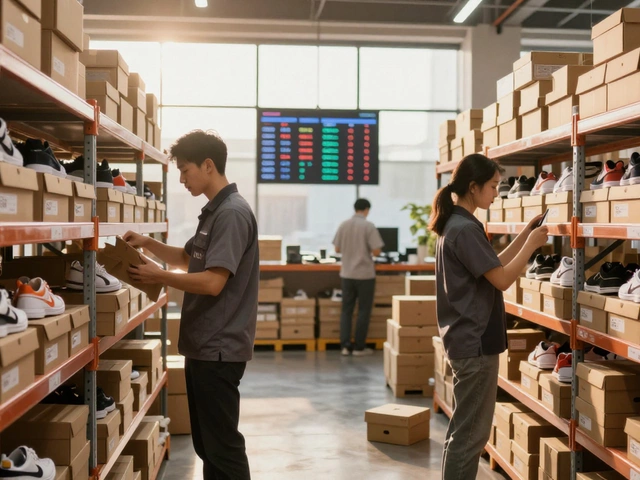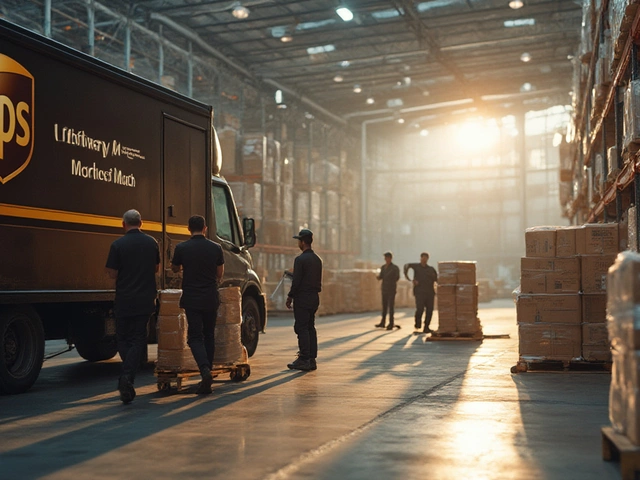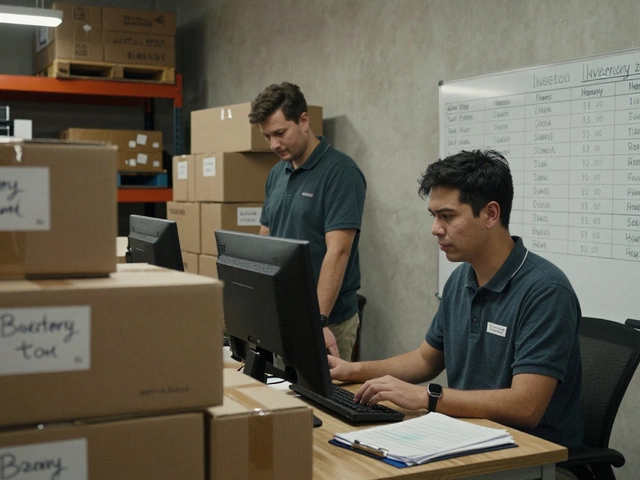The world of courier services is a dynamic one, teeming with opportunities for those eager to explore a career that combines navigation with punctuality. Still, a common query lingers for many newcomers: Does one need a license to be a courier? The answer isn't always clear-cut and depends on multiple factors ranging from the type of vehicle used to the specific region where deliveries take place.
In this article, we'll unpack the essentials of courier service licensing. Whether you're maneuvering through city streets on a bicycle or handling a delivery van full of parcels, understanding the intricacies of legal requirements is paramount. Join us as we explore the nuances, ensuring you're well-equipped to meet any regulatory hurdles with confidence and ease.
- Understanding Licensing for Couriers
- Vehicle-Specific Requirements
- Regulations by Region and Goods Type
- Tips for Aspiring Couriers
Understanding Licensing for Couriers
Becoming a courier is an enticing option for those who enjoy the open road and relish the satisfaction of delivering goods swiftly and efficiently, yet the matter of licensing can sometimes be perplexing. Not every courier needs a commercial driver’s license (CDL), especially if they're using smaller vehicles like passenger cars or bicycles. However, when you're stepping into the world of medium to heavy-duty delivery vehicles, the licensing requirements can shift significantly. For instance, in the United States, the need for a CDL arises when operating vehicles over 26,001 pounds in gross vehicle weight. This distinction ensures that only those who have undergone specific training operate larger, more complex machinery.
Beyond the vehicle size, the type of goods you transport also plays an integral role. Delivering everyday consumer parcels might not have stringent licensing demands, but if your deliveries include hazardous materials, you must adhere to the Hazardous Materials Regulations, which may require additional endorsements on your license. These endorsements ensure transportation safety for both the driver and the public. As global online shopping continues to surge, the diversity in goods being transported highlights the growing necessity for specialized understanding.
"Licensing regulations are crucial not only for safety but also for standardizing service levels across the courier industry," says John Delgado, an expert in transport and logistics.
Moreover, region-specific regulations add another layer of complexity. For example, European countries might have different age and training prerequisites compared to North America. In the UK, couriers using motorcycles must have a category A license, while those using heavier vehicles might need a category C or C1 license, depending on weight. Navigating these distinctions calls for due diligence and an understanding of local law. Knowledge here translates into compliance, which safeguards not just business continuity but also the courier’s career reputation.
The path to becoming a licensed courier isn't merely about ticking bureaucratic boxes. It's about embracing the nuances that come with each niche within the delivery services realm. Having the right courier license is akin to obtaining a passport to a world filled with logistical possibilities. Therefore, for those keen on venturing into this field, it's advisable to first ascertain the specific licensing requirements of their intended delivery services. Consulting local transport authorities or engaging with industry veterans can provide clarity. This foundation, paired with an unyielding drive to serve, can set any budding courier on the road to success.

Vehicle-Specific Requirements
When it comes to becoming a courier, understanding the licensing requirements related to specific vehicles is crucial. Different vehicles come with distinct sets of legal obligations. For instance, if you plan to work using a bicycle or a motorbike, licensing might not be as intense, but it is still important to be aware of local ordinances. On the other hand, operating a delivery van or a truck often requires a more rigorous licensing process. This not only ensures your eligibility to drive these larger vehicles but also proves your competency in managing them on busy roads.
Let's start with bicycles and motorbikes, popular choices for urban courier services. Many regions are lenient, not requiring a special license beyond a regular driver's license for motorbikes, provided the engine size is modest. However, it's essential to have insurance to cover any accidents that might occur. Knowing the bike lanes and traffic laws in your area can also be advantageous. In some cities, authorities require additional permits for using e-bikes, so checking local regulations is recommended. Delivery drivers need to be agile and courteous, which makes competitive driving behavior undesirable.
For those considering a role as a van courier, the requirements become more demanding. A commercial driver's license (CDL) might be necessary, especially if the van's weight exceeds a certain limit or if it carries hazardous materials. As of recent regulations, many regions have adopted stricter emission norms to reduce pollution, which impacts the type of vans used for courier services. Being aware of such eco-friendly policies can save you time and fines. Remember, maintaining your vehicle regularly can not only improve service efficiency but significantly contribute to driver safety, meaning fewer licensing complications.
“In the delivery sector, your vehicle is more than just transportation; it's your business on wheels. Ensuring it meets all regulatory standards, therefore, becomes essential for sustained operation,” commented Sarah Palmer, Head of Logistics at Green Fleet Magazine.
Finally, for those intent on driving medium to large trucks for deliveries, the requirements are distinctive. Trucks used for courier services often necessitate a CDL, with additional endorsements for carrying specific types of goods such as food or chemicals. Some jurisdictions mandate special training courses to ensure that drivers are prepared for the nuances of truck driving. Additionally, newer legal mandates around electronic logs for mileage and hours on the road aim at enhancing road safety for better oversight of driver activity.
Being thorough and informed about your vehicle-specific obligations is not just about compliance; it's about being a responsible delivery driver. The more you know about the legal landscape concerning your mode of transportation, the better prepared you'll be to tackle the road ahead. Expanding your knowledge about these requirements helps you remain professional and safe, ultimately supporting a successful career in the courier industry.

Regulations by Region and Goods Type
When diving into the courier world, understanding the regional nuances and regulations ties closely with what you're transporting. Different countries and even states might have their independent guidelines touching on licensing for couriers, especially when navigating across borders. Majority of the time, lighter vehicles like bicycles may demand fewer formalities, adding to their popularity in urban landscapes. However, once you step into the realm of motorized vehicles, licensing mandates vary notably. For instance, in the United States, a standard driver's license typically suffices for general courier jobs, yet special licenses are required for those driving larger transports. Meanwhile, countries in the European Union might necessitate additional permits to adhere to environmental and safety commitments.
Examining the type, nature, and volume of the goods being transported reveals another layer of licensing complexities. Hazardous materials, perishables, or pharmaceuticals frequently trigger additional licensing requirements. Anyone moving products labeled as potentially dangerous could need a Hazmat endorsement as part of their certification. To illustrate, those in charge of delivering chemicals must meet stringent legal standards. In an enlightening statement, the U.S. Department of Transportation explains, "Safety in hazardous material handling is not just a priority, it's imperative." These considerations protect not only the courier but also the environment and population at large.
Moreover, certain markets might call for unique regulations where high-value items come into play. Think about couriers delivering niche products such as artwork or precious metals; insurance and heightened security measures become pivotal. A quick look at local legislations might save potential hiccups down the line. In recent surveys, the urban logistics market has shown a 7% annual growth rate, underscoring the importance of adhering to proper licensing to stay competitive. Across the globe, a myriad of regulations exists, inciting the need for thorough research based on your operational base.
Ultimately, familiarizing yourself with these multifaceted regulations fortifies your foundation as a reliable courier. By recognizing regional and goods-specific licensing norms, couriers won't just avoid legal troubles; they'll build trust and reputation among clientele. This diligent adherence demonstrates dedication and professionalism, paving the way for success and growth in the fast-paced logistics world.

Tips for Aspiring Couriers
Delving into the realm of courier services can indeed be an exhilarating venture. Yet, to navigate it effectively, foresight and preparation are key. If you're an aspiring courier, understanding the nuances of the industry can significantly bolster your journey. First and foremost, do your research on whether your state or country mandates a specific courier license for the kind of delivery work you intend to pursue. While motorbikes and bicycles often have fewer requirements, a van or truck might necessitate a distinct set of documentation and permissions. Investigating these requirements in advance can save you from bureaucratic stumbling blocks down the line.
Moreover, having a reliable vehicle is crucial. Routine maintenance should be a top priority, considering how vital a well-oiled machine is for timely deliveries. Different regions may have particular vehicle-specific requirements, such as emissions checks or commercial vehicle classification depending on size and weight. Staying abreast of these requirements can prevent unnecessary fines or downtime caused by compliance issues. Besides, consider honing your navigation skills. Familiarize yourself with popular routes, traffic patterns, and local regulations, as this knowledge will not only improve your efficiency but also enhance customer satisfaction.
Equally important is having appropriate insurance coverage. Whether you're an independent contractor or part of a courier network, understanding your insurance needs is non-negotiable. Coverage varies widely, from liability insurance to protecting the goods you're transporting. Navigating through policies might feel like a labyrinth, but taking time to choose the right one will shield you and your cargo from mishaps. Additionally, excel in customer service; being courteous and communicative with clients can set you apart in this competitive field. Make sure to stay professional and cooperative, even when facing challenging situations.
With technology at the forefront of modern courier services, embracing the digital shift can greatly enhance your operations. Utilizing apps for route optimization and package tracking can save valuable time and result in a satisfying customer experience. Staying updated on the latest technological advancements in the field can also present you with innovative ways to improve your service quality and efficiency. In the words of logistics expert Rebecca Solnit, "In the modern era, achieving swift delivery isn't just about speed; it's about precise execution."
Finally, manage your time wisely. Efficient time management can propel your courier career to new heights. Prioritize your tasks, allocate your hours to high-demand slots, and take regular breaks to maintain your well-being. Veteran couriers often advise creating a calming pre-delivery ritual to help you stay focused and energized throughout your day. This not only boosts productivity but also mitigates fatigue from long hours on the road.





